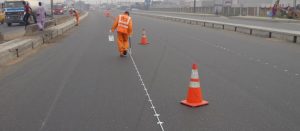Lagos announces plans to ease lockdown restrictions – Tek Portal

Strict measures to contain the coronavirus have been in place since late March, but a “controlled easing phase” will begin on May 4 that will allow offices, business, markets, and stores to resume operation with limited hours and staff capacity.
Schools and religious buildings will remain closed for now, with new standards of sanitation to be imposed on public transport such as compulsory masks and hand-washing facilities.
In an interview with CNN ahead of the address, Governor Sanwo-Olu described the measures as a “little bit of a breather” for Lagosians but warned that this was not a return to normal and that the threat of the virus would remain for the foreseeable future.
Lagos has been the epicenter of the outbreak in Nigeria with 844 confirmed cases and 19 deaths as of April 28 (since revised to 20 deaths), and the governor warned citizens to expect more bad news as tests increase.
“I would say we are getting to peak season,” said Sanwo-Olu. “We will still see numbers because testing is now ramped up.”
Testing was limited by a lack of available kits in the early days of the outbreak, he said. Around 8,000 people had been tested from a population of more than 20 million.
But the state’s capacity has since expanded with four centers now accredited to conduct tests with a target of 1,000 a day in total.
Governor Sanwo-Olu was scathing about the emergence of private health facilities offering sub-standard and exploitative treatments.
“(Some) private hospitals don’t understand the protocols to manage the preparation of staff to make sure they are safe to treat Covid-19 patients,” he said. “The ones attempting to make financial benefit…we have closed some down.”
Relief measures
The Nigerian government had previously announced a raft of relief measures aimed at mitigating the economic damage of the outbreak, such as reducing interest on loans and the creation of a credit facility for households and small and medium enterprises.
The governor said further assistance would be forthcoming, including through new grants and work with the private sector to minimize redundancies. He did not volunteer details of how private companies would be supported or incentivized not to cut staff.
Sanwo-Olu also defended the state’s record on tackling poverty and hardship during the crisis, with CNN having reported that many insecure workers face a choice of working or going hungry, and cannot isolate at home.
Relief efforts were targeting “the bottom of the pyramid – the vulnerable, the elderly, and physically challenged,” said Sanwo-Olu, claiming the state had provided food to 800,000 households. “The point was not for everyone to get it, the point was for the vulnerable to get it.”
The governor said his administration had been working with religious and minority groups to ensure supplies reached the areas of greatest need, and was working alongside philanthropists to coordinate relief efforts.
No return to normal
Despite the loosening of restrictions in Lagos, Sanwo-Olu reiterated that many would remain in place.
“Zoom meetings could become a way of life” for people in non-essential occupations, he suggested, adding that large gatherings remained a distant prospect.
In the governor’s subsequent address he re-imposed a curfew between 8pm and 6am, a ban on interstate travel, and closures on cinemas, bars, clubs, parks, gyms, and salons.
A new measure was also introduced: a hotline for whistleblowers to report people breaking the rules.
The message was clear. Restrictions may be easing, but Lagos will not be returning to business as usual anytime soon.
Ifeanyi Abraham contributed to this report.
http://rss.cnn.com/~r/rss/edition_africa/~3/6bAzraFk_S8/index.html






